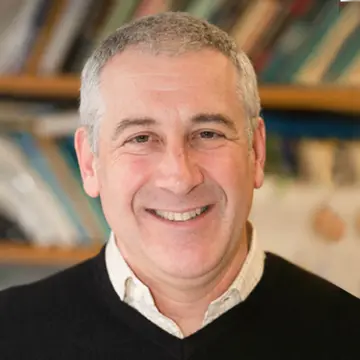The unintended consequences of automated vehicles
Prize-winning research from MIT Sloan warns some locales may be heading for a ‘public transit death spiral’ with the advent of automated vehicles.

Faculty
Charles Fine is the Chrysler Leaders for Global Operations Professor of Management at the MIT Sloan School of Management. Between 2015 and 2022 he served as CEO, President, and Dean of the Asia School of Business (in Kuala Lumpur), established in collaboration with MIT Sloan.
His research has focuses on supply chain strategy and value chain roadmapping, with a particular focus on fast-clockspeed manufacturing industries. Fine’s work has supported design and improvement of supply chain relationships for companies in electronics, automotive, aerospace, communications, and consumer products. His work has also examined outsourcing dynamics, with a focus on dynamic models for assessing the leverage among the various components in complex industrial value chains and the principles for value chain design, based on strategic and logistical assessments. Most recently, he has been in the area of operations strategy for early-stage, entrepreneurial organizations and looking at how AI tools are changing the practice of product management.
At MIT Sloan, he has taught Operations Strategy, Supply Chain Management and Product Management. Fine teaches and consults widely with numerous global clients. He has served on the board of directors for Greenfuel Technologies Corporation, a biotechnology company that he cofounded, which focused on renewable energy. Fine has also served for over 20 years as co-director of an executive education program, Driving Strategic Innovation, which is a joint venture between MIT Sloan and IMD in Lausanne, Switzerland.
Fine is the author of Clockspeed: Winning Industry Control in the Age of Temporary Advantage (Perseus Books, 1998) and Faster, Smarter, Greener: The Future of the Car and Urban Mobility (MIT Press, 2017). His work on quality management, flexible manufacturing, supply chain management, and operations strategy has appeared in a variety of publications, including Management Science, Operations Research, Journal of Manufacturing and Operations Management, Production and Operations Management, Annals of Operations Research, Games and Economic Behavior, Sloan Management Review, Supply Chain Management Review, and Interfaces.
Fine holds an AB in mathematics and management science from Duke University as well as an MS in operations research and a PhD in business administration from Stanford University.
Phadnis, Shardul S., and Charles Fine. International Journal of Production Economics Vol. 269, (2024): 109155. SSRN Preprint.
Fine, Charles H., Loredana Padurean, and Sergey Naumov. Production and Operations Management Vol. 31, No. 12 (2022): 4599-4615.
Naumov, Sergey, David R. Keith, and Charles H. Fine. Production and Operations Management Vol. 29, No. 5 (2020): 1354-1371. Supplemental Materials.
Fine, Charles H., Loredana Padurean, and Sergey Naumov. Academy of Management Global Proceedings Vol. Tel Aviv, No. 2018 (2018).
Sumantran, Venkat, Charles H. Fine, and David Gonsalvez. Cambridge, MA: MIT Press, 2018.
Sumantran, Venkat, Charles H. Fine, and David Gonsalvez. MIT Sloan Management Review, March 2018.

MacroCycle Technologies, a startup co-founded by MIT alumni Stwart Peña Feliz, MBA '23 and Dr. Jan-Georg Rosenboom turns plastic and polyester waste into virgin-grade PET (a type of plastic) using a process that consumes 80% less energy than traditional methods—providing a pathway where plastics are not only diverted from landfills and the ocean, but can also be turned back into plastics without the emissions when powered with renewable energy. Two years after launching his company, Peña Feliz was eager to share what he’s learned with current MIT Sloan students. And Product Management Lab (PM-Lab) students Alain Hyacinthe, MBA ’26; Mallika Khanna, MBA ’26; Jules Nguyen, MBA ’26; and Ethan Takeyama, MBA ’26; were eager to help MacroCycle take its next big step: entering new markets in the world of textiles.

Prize-winning research from MIT Sloan warns some locales may be heading for a ‘public transit death spiral’ with the advent of automated vehicles.
Professor Charles Fine … talks about how the school has weathered the pandemic and where the future lies in executive education.
Prof. Charles Fine spoke with Balance of Power host David Weston about the semiconductor chip shortage and supply chain issues.
This joint program with IMD helps business leaders successfully manage innovation from concept to commercialization. Drawing on a dynamic and integrative value chain framework created at MIT, participants learn how to build organizational relationships that facilitate knowledge transfer, both within the firm and across the value chain.